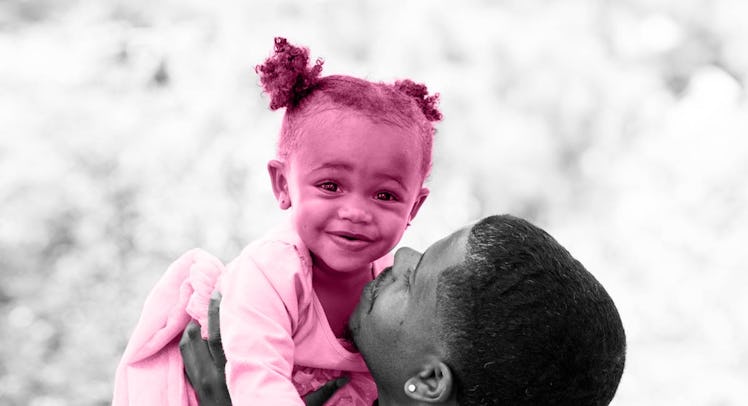How to Wash and Take Care of Infant and Baby Hair
Parents shouldn't go overboard when caring for a baby's hair.

Baby hair seems the most delicate of all the parts of an infant’s body: It grows from an underdeveloped skull, is often extremely fine, and can easily become tangled as it grows. Getting the hang of baby hair care and navigating the vast array of baby hair products can cause anxiety and confusion. But when it comes to caring for an infant’s hair, a relatively hands-off approach is best.
Most pediatricians advise only bathing an infant one to two times a week, and when a baby is in a tub, washing their hair can be a soothing experience. Luckily, there’s no right or wrong way to actually do it.
“There isn’t any particular method: It’s whatever works for you as a parent, and what’s comforting for the baby,” says Sarah Stampflee, assistant nurse manager at the Randall Children’s Hospital NICU in Portland, Oregon. “Some babies don’t like to have things poured over their head. Just take a washcloth and put a little soap on it and wash it that way and rinse gently. Some babies prefer having that warm water poured over them. Read the baby’s cues. If the baby doesn’t like it, try something different.”
How to Wash a Baby’s Hair
- Limit washing to once a week at most.
- Use paraffin-, fragrance- and latex-free shampoos that are safe for baby skin and eyes.
- African-American babies might benefit from aftercare with a regimen of natural oils to keep hair supple.
- Use soft, wide-toothed combs and hairbrushes to work on tangles from the bottom up.
- Understand that some baby hair loss is natural.
While frequent shampooing isn’t necessary (or even recommended), parents are advised to pay very close attention to what kind of shampoo they use on their baby’s hair during a bath. It’s recommended soaps be paraffin-, fragrance-, and latex-free, both to avoid irritating eyes and skin and to prevent the child from being exposed to chemicals.
“All those soaps that smell really good unfortunately are probably not best for your baby, because that’s added fragrance which is an added chemical,” Stampflee explains.
Special Care for African American Baby Hair
For African-American babies, whose hair is typically thicker, curlier, and prone to dryness, it’s recommended that parents treat the hair with a weekly regimen of oils to prevent breakage and keep hair healthy. Natural oils like avocado, jojoba, and almond oil can be applied post-bath by rubbing it into the hair and scalp, then using a soft brush or wide-toothed comb to work it into the hair.
Combatting Knots in Your Baby’s Hair
Haircare isn’t just limited to bath time. Parents should use soft brushes to keep hair from tangling as it grows, lest they be cursed with a night of combing knots out of a screaming child’s hair. But, as hair gets longer, tangles are inevitable, as is a very unhappy child dealing with parents tugging through their hair. Tackling those knots depends on the cause.
RELATED: The 14 Best Bath Toys For Babies And Toddlers
“A lot of times its food, snot, things they put their hands in, so some parents opt for a quick wash to deal with knots,” says Stampflee. “With longer hair, if you start brushing from the bottom and work up it tends to work a little bit better. But for babies, there’s really no great way.”
This also applies to babies with thicker and curlier hair, though parents should brush their manes more frequently and exercise more caution: They shouldn’t brush hair when its dry, and a natural moisturizer should be used to prevent pain and extra tangling.
MORE: 6 Myths About Bath Time That Every Parent Should Disregard
Infant Hair Loss
When it comes to most issues with infant’s hair, parents can breathe a sigh of relief knowing that baby hair isn’t a permanent thing, as some infant hair loss is to be expected.
“Baby hair is supposed to fall away and essentially shed; it kind of sheds and regrows,” says Stampflee. “A lot of times babies will get a bald spot on the back of their head: That’s just friction wearing the hair out sooner. Babies are born to be resilient creatures. It takes a lot to cause any damage. Don’t worry.”
This article was originally published on